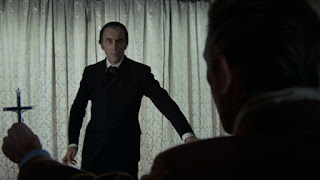Michael Wheatley (ed)
British Library Tales of the Weird
Many writers in the early twentieth century particularly were fascinated by Pan as a figure of unbridled vivacity and pagan ecstasy, but also associated the god and folk hero with a sense of danger and even horror.
Selecting an eclectic cross-section of tales and short poems from this boom of Pan-centric literature, many first published in the influential Weird Tales magazine, this new collection examines the roots of a cultural phenomenon and showcases Pan’s potential to introduce themes of queer awakening and celebrations of the transgressive into the thrillingly weird stories in which he was invoked.
I wonder if there's a deity more suited to these times than
Pan; a god continually remoulded through his renaissance over the centuries to reflect our changing attitudes towards the untamed and the natural, a god cut adrift from his roots in Greek antiquity and now free to roam across our wildest imaginings.
Opening this fascinating collection of prose and poetry is the poem 'Pan A Double Villanelle' by the arch-decadent Oscar Wilde, a lament for the absence of the wild, the free, the colourful and imaginative in the grey lifelessness of England at that time.
Following it we have the story that gives this collection its subtitle,
Arthur Machen's 'The Great God Pan' which despite being amongst the most famous stories revolving around the goat footed god it should be noted that Pan is entirely absent from the story. In the tale a young woman is operated on and "a slight lesion in the grey matter" is made to allow her "to see the god Pan". Whether or not this is what happens to poor Mary we never know but after waking from the operation she experiences a moment of wonder followed by utter insanity at which point she exits the story to be eventually replaced by another. I remain unconvinced that in his use of the name Pan that Machen is actually invoking the god but is instead using the name as a metaphor for life beyond the confines of civilisation and conventional morality. In the aftermath of the operation Mary sees the wildness within and becomes absent of morality and sanity, a condition passed on to her daughter who lives her life in a state of wildness, in the amorality of nature, until it's pointed out to her and she crumbles away, an example of the flimsiness of a life lived without the moral restraints that modern civilisation brings.

's 'Pan' takes a different track to its predecessor, a feature common to the rest of this very well curated anthology, where it's the music of Pan that awakens a longing in a young woman that is misunderstood until it's too late.
Elizabeth Barrett Browning's poem 'A Musical Instrument' tells of the God's chase of
Syrinx and the creation of his characteristic pipes before
Barry Pain allows the God to catch a different quarry in his tale of irresistible compulsion, 'The Moon-Slave'.
One of the unexpected delights of the book was the chapter from Kenneth Grahame's 'The Wind in the Willows' which I've never read or even remotely wanted to due to an aversion to anthropomorphised animals but 'The Piper at the Gates of Dawn' which tells of Rat and Mole's encounter with Pan proved to be a complete delight.
The brilliant Edwardian satirist
Saki (Hector Hugh Munro) is represented by 'The Music on the Hill', the first of a run of stories here that I'd read before in other collections, but very happily it makes for an enjoyable re-read as a town bred socialite falls foul of Pan's more vindictive side after she spurns his existence.
Edith Hurley on the other hand is rueful for his absence in the modern world but is open to hints of his presence in her poem 'The Haunted Forest'.
E.M. Forster's 'The Story of a Panic' positions Pan as a liberator of the spirit, one who frees those who need it from the straightjacket of 'normal' society, in this case with a thinly veiled story of a young man's realisation of his own sexuality.
Shining above many of the others, even in a collection as good as this, is Algernon Blackwood whose 'The Touch of Pan' with its characteristic rejection of industrial society and it's submergence in the rural and the wild tells a tale of erotic freedom and purity of desire whereas A. Lloyd Bayne's poem 'Moors of Wran' tells of the more destructive aspect of the God..
Until I read it here I was convinced I'd already read
Margery Lawrence's 'How Pan Came to Little Ingleton' but I'm not so sure now and very glad to now have done so as it proved to be an amusing tale of Pan's more bucolic and pastoral nature as he guides a belligerent priest to a more caring and accepting place that provided a gently wonderful and witty highlight.
In 'The Devil's Martyr' Signe Toksvig (great aunt of broadcaster Sandi) brings the gothic in the form of avaricious flagellating monks and an escape within the groves of Pan which are lamented in Willard N. Marsh's poem 'Bewitched' and which call to the newly wed Constance in David Keller's 'The Golden Bough'.
The excellent collection ends with a poem and a story by Dorothy Quick, the former an ode to the ecstatic nature of an encounter with the god whereas the latter - actually the older of the two- digs deeper into that idea and the toll it takes as a bride hankers for wildness in a time of domesticity.
At the end when we close the book we are holding a fantastic collection, possibly the best in the series, that encompasses many of the ways which authors of the late 19th and early 20th centuries developed and explored and utilised Pan to express notions of freedom, of beauty and of self-determination often placing him in the face of an increasingly homogenised modern, industrial age and one is left wondering how Pan could be once again recalled in our own time of imminent ecological collapse as an avatar for a new green awareness.
..........................................................................................
If
you enjoy what we do here on Wyrd Britain and would like to help us
continue then we would very much welcome a donation towards keeping the
blog going -
paypal.me/wyrdbritain Any affiliate links are provided for your convenience and to help mitigate running costs.


























